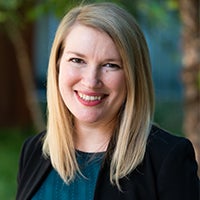April 2025

Director, Religion and Public Life Center
Over the past six weeks, the Religion and Public Life Center hosted three of our signature Religious and Civic Leader Gatherings. These events bring academic, religious, and civic leaders together in an intimate setting to grapple together with pressing issues of religion in public life and to engage with cutting-edge research on religion. In the wake of these gatherings, a few things are staying with me:
We need to recognize the stresses and strains that clergy are facing as they navigate social/ political polarization in their congregations.
As sociologist David Eagle shared with us recently, congregants have a significant impact on religious leaders' mental and physical health. These dynamics reminded me of the need to have compassion for our leaders and to care about their wellbeing in these fraught times.
We need to better listen to and learn from young Americans.
When Melissa Deckman, a political scientist and CEO of the Public Religion Research Institute, visited us, a big topic of discussion was how religious leaders (but also academic and civic leaders) can better support Generation Z. Many in Generation Z are feeling hopeless and pessimistic about the future, and many are also deply concerned with issues of gun violence, climate change, and th treatment of LGBTQ+ people--issues that they often feel institutional leaders are not addressing sufficiently but that impact them (and their futures) directly. I was left pondering how leaders can demonstrate care for the existential impact of these issues on Gen-Z and future generations.
We need to think about what might need to change in our religious organizations if we are committed to supporting the flourishing of leaders of color and creating communities that serve everyone.
Sociologist Oneya Okuwobi recently shared her research on the experiences of leaders of color within religious organizations that are trying to become more diverse. Oneya shared the painful experiences and stress that leaders of color experience amidst efforts to diversify congregations, noting that leaders pay high costs for the outcome of "diversity." She helped me realize that the right goal for organizations should be a focus on helping leaders in their midst who are part of marginalized communities thrive as leaders (and that means creating an environment that supports leaders thriving over and above other aims).
In all of this, I was left deeply reflecting on how we can set up institutions and structures that value and support the leaders who work in them and, by extension, enable these same leaders to better serve and support those around them. When we start thinking about how leaders can thrive, we start thinking about community care, and when we start thinking about community care, we start thinking about the common good, and that's where the good stuff is.
And this is why the Religious and Civic Leader Gatherings are a continual source of meaning and joy to me. They embody the commitment of the RPLC to use research on religion to build common ground for the common good. These gatherings are also where I concretely see the value of research on religion, as ideas are put in motion and given a chance to deepen through their interaction with experienced practitioners.
My hope is that after each gathering, attendees will walk away with something tangible that illuminates their own context and leadership practice. I want people to be exposed to new ideas ad voices that they don't always have the opportunity to encounter in their day-to-day work, but also to be encouraged in their work. And indeed, the questions and dialogue sparked in each gathering we host speak to the desire of our leaders to be supported and also to provide support to those they lead, renewing my conviction that a commitment to the common good is alive and well.
Rachel C. Schneider
Director, Religion and Public Life Center
